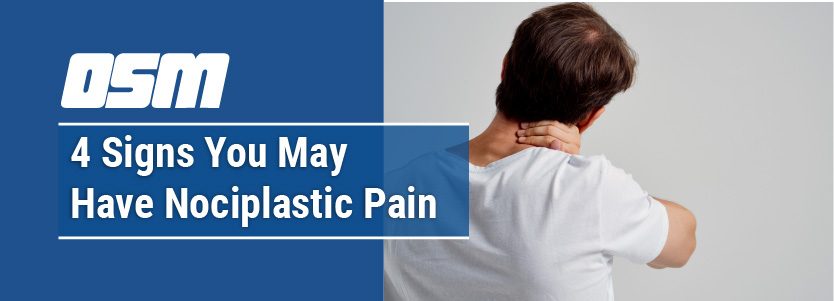Article featured on WebMDChronic back pain, migraines, and irritable bowel share the feature of nociplastic pain. In 2016, the International Association for the Study of Pain (IASP) proposed the term nociplastic pain to describe discomfort that arises from abnormal sensory processing in the brain. Nociplastic pain, also referred to as central sensitization, is similar to an engine light check flashing on your car dashboard, despite the engine being fine. Unfortunately, this confused signal amplifies the pain you feel.
The four signs that you have nociplastic pain include:
- Your symptoms persisting long past the expected healing time
- Pain spreading beyond the boundary of the injury area
- Having an increase in sensitivity to painful stimuli
- Non-pain symptoms developing like fatigue, disrupted sleep, and brain fog
Symptoms Are Long-Standing
The disordered sensory processing seen with nociplastic pain develops over time. Symptoms are present for longer than 3 months, often lasting years. An injury or stressful event may trigger the pain, but abnormal pain processing perpetuates it.
A common example is a disk herniation in the back. The disk herniation may heal after 6 months, but sensitization can perpetuate the pain after the injury has healed.
Symptoms Spread Beyond the Expected Area of Injury
The pain area spreads to involve a greater region of the body. For example, instead of a small area of the back hurting, you feel discomfort across your back and into the legs. Someone with a pinched nerve in their neck may feel their entire arm is numb instead of just the area supplied by the nerve.
Increased Sensitivity to Painful Stimuli
A lowered threshold for feeling pain develops. You feel pain more easily than those without sensitization. For example, let’s look at two people, one with sensitization and the other without it. They both lift a 50-pound box and feel a pull in the back. The person without sensitization reports the pain as a “3 out of 10.” Meanwhile, the person with sensitization reports the pain as a “7 out of 10.” The nerves are telling the brain it hurts more than what a person without the condition feels. It’s not the person overreacting; the intensity is very real. The sensation is because the nerves are hypersensitive.
Non-Pain Symptoms
In addition to affecting how pain is experienced, sensitization causes symptoms that affect the entire body. These are called “non-pain symptoms.” They include fatigue, poor sleep, and thinking difficulties (brain fog).
The fatigue can be severe, with a much lower energy level compared to others of the same age and health. Fatigue sets in sooner and recovery takes longer. For example, after an hour of exercise, someone with sensitization may need to rest for the remainder of the day or 2 days.
The environment is full of sensory inputs, and sensitization magnifies these stimuli, too. The impact of harsh lights, loud noise, and odors is amplified. These stimuli may provoke headaches, nausea, or dizziness.
If you recognize the four signs in yourself, talk with your provider about nociplastic pain. The treatment approach for this pain type is different from others, making a correct diagnosis imperative. Get the right diagnosis, so you receive the right treatment.
The Orthopedic & Sports Medicine Center of Oregon is an award-winning, board-certified orthopedic group located in downtown Portland Oregon. We utilize both surgical and nonsurgical means to treat musculoskeletal trauma, spine diseases, foot and ankle conditions, sports injuries, degenerative diseases, infections, tumors and congenital disorders.
Our mission is to return our patients back to pain-free mobility and full strength as quickly and painlessly as possible using both surgical and non-surgical orthopedic procedures.
Our expert physicians provide leading-edge, comprehensive care in the diagnosis and treatment of orthopedic conditions, including total joint replacement and sports medicine. We apply the latest state-of-the-art techniques in order to return our patients to their active lifestyle.
If you’re looking for compassionate, expert orthopedic and podiatric surgeons in Portland Oregon, contact OSM today.
Phone:
503-224-8399
Address
17355 Lower Boones Ferry Rd Suite 100A
Lake Oswego, OR 97035
Hours
Monday–Friday
8:00am – 4:30pm



